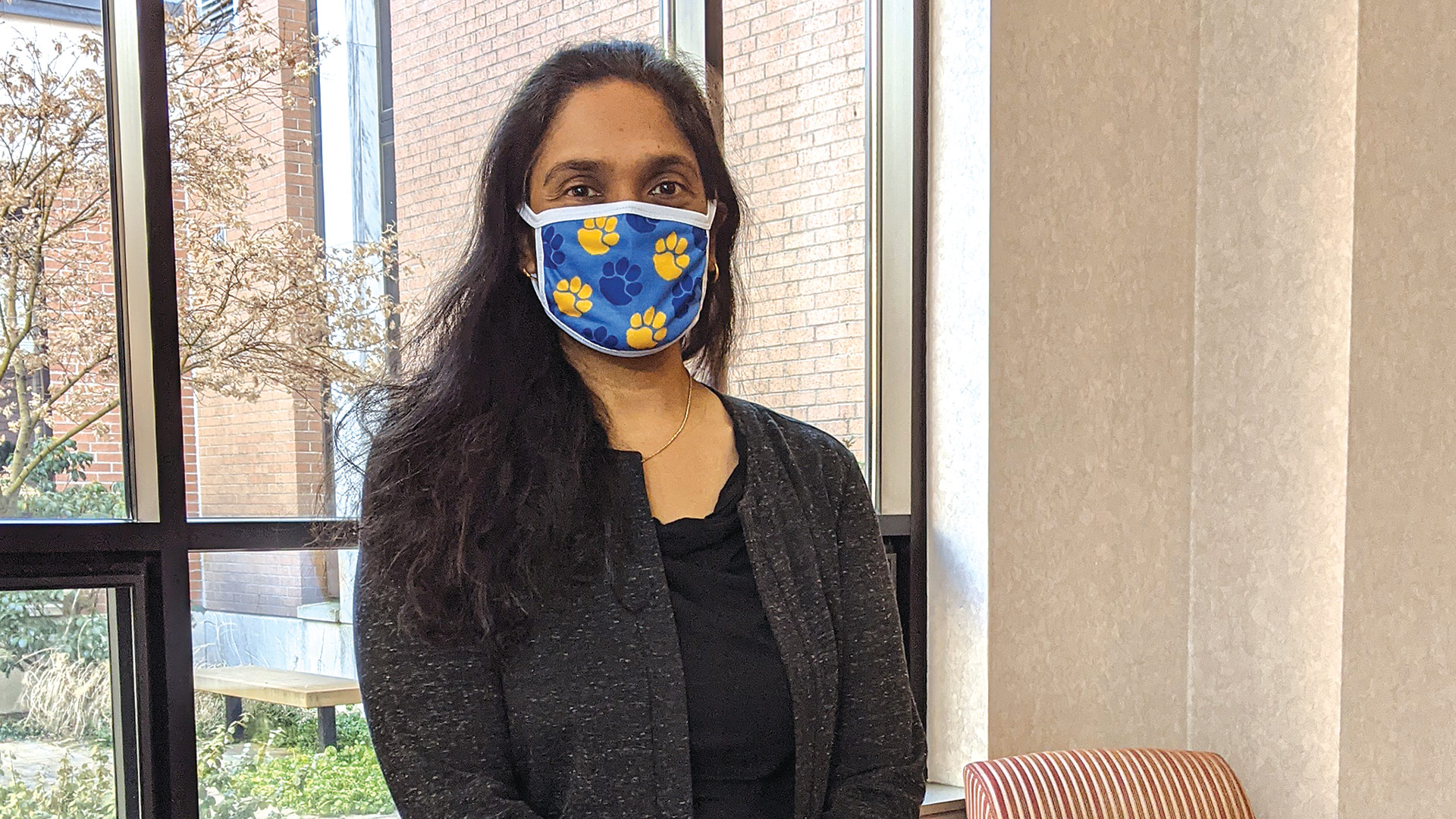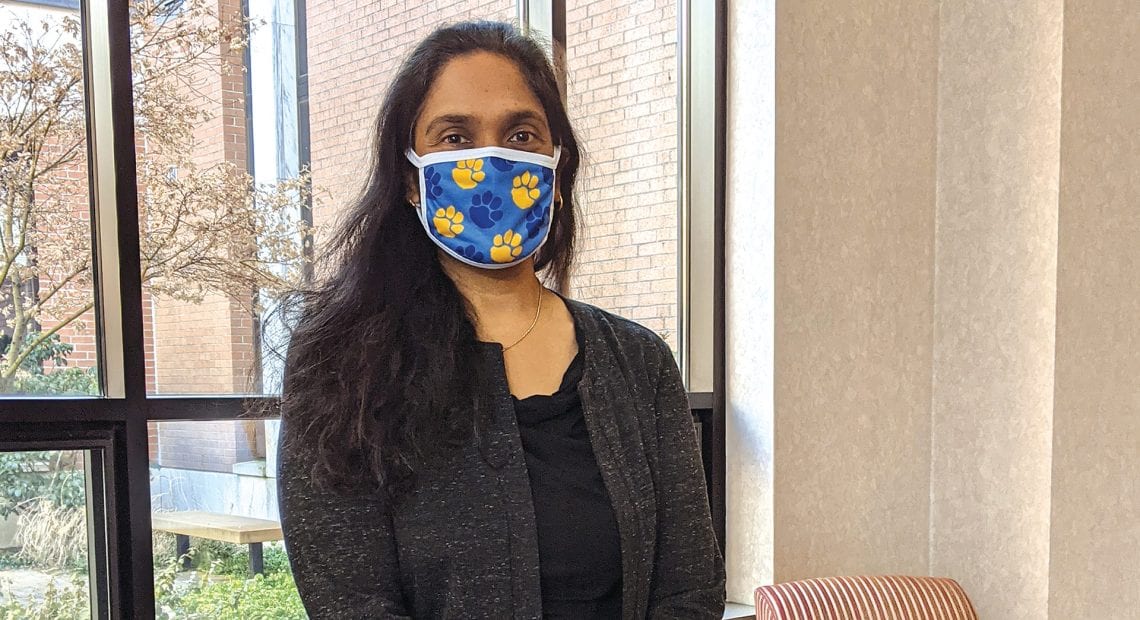A Challenging Docket

Sudha Setty says the field of law continues to evolve and create new opportunities, even during the pandemic.
It’s been a challenging year for businesses of all kinds, and the profession of law is no exception.
But in many ways, the pandemic set the critical role of lawyers in even sharper relief, says Sudha Setty, dean of the (WNEU) School of Law.
“I hear, anecdotally, from our alumni that they’re busy; they have a lot of work going on. Frankly, the legal work coming out of the pandemic is substantial,” she told BusinessWest, and it extends far beyond business disruptions.
“The pandemic has hit very unevenly in a lot of communities, including Western Massachusetts, and you have issues of trying to get unemployment benefits or ensuring against foreclosure of homes or eviction,” she noted. “A lot of legal needs have come out of all that. Those needs existed previously, of course, but the pandemic has exacerbated them. So the need for lawyers to help in those capacities has increased exponentially in the past year.”
Or take the growing (literally and figuratively) field of cannabis; a course on “Cannabis and the Law” is hugely popular, Setty said, because students see legal opportunities in an industry that still has plenty of room to expand.
“I hear, anecdotally, from our alumni that they’re busy; they have a lot of work going on. Frankly, the legal work coming out of the pandemic is substantial.”
“It’s a new field, and it’s not going away. It’s a way to think about new opportunities as a lawyer, but you’re also learning nuts and bolts you can apply to other fields as well, like regulatory law and how to navigate state bureaucracy and a lot of other pieces that will be helpful even if your practice isn’t in cannabis law in the long run.”
In short, the world will always need lawyers, and after a very uneven past two decades when it comes to the job market and law-school enrollment, colleges across the U.S. have reported an uptick in applications over the past few years, one that hasn’t been slowed by the pandemic.
WNEU welcomed an incoming class of 130 last fall, well over the 88 who started classes in the fall of 2018, Setty’s first year as dean. While the fall 2021 numbers won’t be finalized until the summer, she hears from Admissions that applications are still strong.
“Nationwide, I know most law-school applications are up significantly,” she added. “In this region, it’s up about 20%, and we’re about the same. So I feel cautiously optimistic.”
Programs she has shepherded have only made WNEU a more attractive destination — for example, the Center for Social Justice, launched in the spring of 2019, has offered a robust series of community conversations, pro bono opportunities, and other initiatives aimed at giving students real-world experience in making a difference, even while in school.
“Students have always been interested in that mission, but now we have this focal point and can shepherd students toward job opportunities, toward scholarships, toward career paths, thinking about what they need to be a social-justice lawyer,” she said, noting, as one example, the Center’s Consumer Debt Initiative, which helps area individuals who are unrepresented in debt collection, sometimes over a few hundred dollars, sometimes a few thousand.
“We’ve heard a lot of discussions over the last few years about income inequality and economic justice, and I think we’re in a really good place in meeting the interests students have when they come into the law school.”
“They can make a difference in someone’s life. It’s a way for students, faculty, and lawyers from the greater community to address this economic-justice issue. We’ve heard a lot of discussions over the last few years about income inequality and economic justice, and I think we’re in a really good place in meeting the interests students have when they come into the law school.”
Add it up, and the WNEU School of Law hasn’t slowed down its pursuit of building a program that will remain relevant in the ever-changing field of law, well after life — and the educational experience — return to something resembling normal.
Back to School
Like every college and university, WNEU had to scramble last spring to get students learning remotely, and faculty and staff spent the summer raising their online competencies to make sure courses would be even more effective in the fall.
“Some of them were already ahead of the curve,” Setty said. “For some of us, including me, it was a lot of learning, a lot of training, a lot of mock classrooms we did with each other to build up our ability. This place is about good teaching, and that was the really important thing to drive home — that, by the time we got back in August, everyone had to continue this excellence in teaching as part of the ethos of the law school — in a hybrid format, if they had to.”
The 2020-21 year has, indeed, taken a hybrid form, with students alternating between learning remotely and in classrooms at the Blake Law Center, due to social distancing and capacity limits. “The largest classrooms normally hold more than 100, and now they’re at 40-something. So the students are rotating through,” she added. “Some students, for health reasons, can’t come at all, so they’re fully remote. That’s the way we’ve been operating.”
The law school has long been known for its use of clinics — in areas such as criminal defense, criminal prosecution, elder law, and family-law mediation — in which students blend classroom instruction with work on real cases, under the guidance of local attorneys. The vast majority of students get involved in clinics and externships, understanding the value of developing not only real-world legal knowledge, but the soft skills that will make them more employable.
Those clinics are still operating, Setty said, but they now feature a strong remote component as well.
“Lawyering these days is largely remote,” she noted. “Client counseling is remote. Witness interviews are remote. We have remote hearings in front of judges. So there’s a separate and related set of competencies that our students are learning, which deal with remote client presentation. It’s very different than what they’ve had to do before, and it has its challenges.”
However, she continued, “the flip side is that this is going to be a part of lawyering going forward. Everything’s not going back to fully in person after the pandemic fades. There are going to be some elements of remote trial work and remote client counseling, so I feel like our students are on the cutting edge of learning this stuff, so when they’re out looking for jobs, they can say, ‘not only do I have this skill set, I also have remote competencies in client representation; I’ve been a remote mediator, I’ve represented people in a criminal proceeding remotely.’ These are remarkable experiences they’re having — they’re very different, but absolutely what we need to do.”
Those graduates are entering a job market that has proven resilient during the pandemic, Setty said, noting that the contraction of law-school enrollment nationally a decade ago has gradually increased demand for talent.
“A lot of law schools were fully online for the full year, but we made a commitment and said, ‘we want to see our students in person and make this work.”
“The employment piece for the folks graduating during the pandemic, I think there’s still uncertainty around that,” she said. “But for the most part, our graduates have kept their jobs.”
The school has added some faculty members in the past two years, most recently Jennifer Taub, who specializes in white-collar crime, criminal procedures, and other business-law subjects, and authored the book Big Dirty Money: the Shocking Injustice and Unseen Cost of White Collar Crime.
“We’re on a positive swing,” Setty said. “The energy of our students, our faculty, and our staff has been terrific. Working through a pandemic requires a lot in terms of navigating the uncertainty and the need to adapt, but also all the hours it takes for faculty and staff to dig in and collectively make this work so we can have in-person education here.”
Community Focus
Setty took the reins as dean of the School of Law in 2018 after 12 years as a professor at WNEU. She first joined the faculty in 2006 as a professor of Law and associate dean for Faculty Development and Intellectual Life, and has produced notable scholarship in the areas of comparative law, rule of law, and national security.
Through her career, she has maintained that law schools are in a unique position to impact the future of a just society, and she has always seen WNEU as a place that launches the careers of thoughtful lawyers who work for the betterment of both their clients and society as a whole. The Center for Social Justice has been an important part of that philosophy over the past two years.
“I really wanted to establish this center and get it off the ground, and it has been terrific,” she said, crediting grants from MassMutual, individual law firms, and other entities to help fund its programming. “Not only is it a way to help our students and meet the social-justice mission of the law school, but it does such good work in the community. It’s great for attracting new students, but it’s also great for the work it does.”
Areas of focus have included economic justice, racial justice, and a recent effort, funded by a WNEU alum, to create an LGBTQ speaker series and support summer work in that realm for two students each year.
“It draws people in with a lot of interests,” she said of the center. “People come to law school wanting to make the world a better place, and they’re wondering how to do that — this speaks to them in a way that’s really profound.”
In fact, the law school as a whole has taken a hard look at its own efforts toward racial justice and diversity, equity, and inclusion issues, Setty said, from the coursework to how it connects with the outside community on issues like police practices.
“We have made an effort to think more about this and integrate it into our curriculum and how we engage in the larger community, but I want to do it in a sustained fashion so it’s not like, ‘oh, that was the focus for 2020; we don’t have to think about it anymore.’ The idea is to integrate it into who we are as a law school and focus on it going forward as well. It shouldn’t be a flavor-of-the-month issue, and then we move on.”
Setty is, however, more than ready to move past the pandemic and welcome students back on campus full-time, but she’s proud of what has been accomplished during the past unprecedented year.
“A lot of law schools were fully online for the full year, but we made a commitment and said, ‘we want to see our students in person and make this work,’” she told BusinessWest. “And we’ve been relatively successful. I continue to be really grateful to be the dean — particularly at a time when it’s required so much collective effort to make this happen.”
Joseph Bednar can be reached at [email protected]







